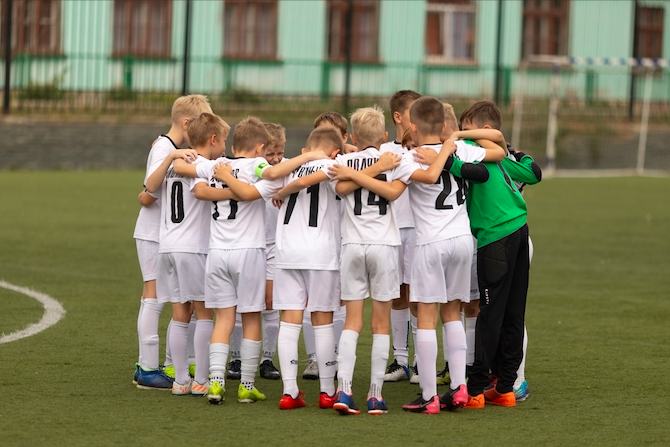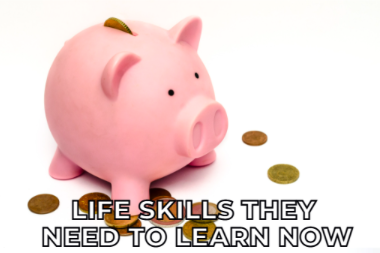Have you ever found yourself doing everyday tasks and wondering, “why didn’t I learn how to do this at school?” It happens to all of us! From changing a tire to creating a budget, there are many life skills that we could all benefit from developing through our K-12 grade education.
Of course, it is important to learn Science or History. But developing real-life skills that will go with us no matter our path is crucial for personal and professional success. So if you are wondering how to support your child outside of school to help develop life skills, check out these four essential life skills for your students.
Time Management Skills
As adults, we know that managing our time is essential to setting goals, meeting deadlines, or even arriving on time for a doctor’s appointment. So the earlier your child starts to understand the importance of measuring time, the better.
Young Children:
You can start introducing time management at home by setting a timer for them to complete a task like brushing their teeth or making the bed. Additionally, playing music while completing the task could make their initial time management experiences much more fun!
Middle Schoolers:
For children this age, having their own calendar can help them prepare for upcoming assessments, athletic events, or determine how much time they need to complete a school project. Stickers, markers, or post-its can make a calendar much more engaging!
Teens:
It is essential that your teen knows how to manage their time effectively before heading out to college. High school is the perfect time to learn how to break big tasks into smaller ones. So, for example, suppose they aim to ace their SAT. They can divide it into smaller tasks like signing up on time, preparing index cards, attending study group sessions with their peers, etc. Remember, by promoting effective time management, you will give them a lesson that will last a lifetime.
Teamwork
Being a team player is something that we all thrive to do regardless of our job title. Having the skills to work with other people will not only impact your child’s future professional career but also their relationships with friends and family.
Young Children:
Sharing is caring! Guiding your child to take turns while playing with their friends will help them understand that sharing time, toys, and responsibilities is vital in any group.
Middle Schoolers:
Students this age can benefit significantly from joining sports teams or clubs. It will show them firsthand how everyone on a team has a role and should work together to achieve a common goal.
Teens:
Partaking in fun group activities with your teen, like going to an escape room or playing board games at home, will show them how to delegate, express themselves, be respectful of other people’s opinions, and become accountable for their actions. Who says you can’t have fun while learning life-long skills?

Budgeting
A huge part of being a successful adult is managing personal finances. Yet, many students enter college not knowing how to do so! Starting to learn how to budget from a young age is key. Helping your child understand that what they want may vary from what they need will help them start prioritizing and choose to spend their money wisely.
Young Children:
Showing your child how to save and budget can be a visual experience. Have your child help out around the house with chores like putting their toys away or helping take out the trash. Then, using a clear jar to save their money, they can visually see how their money can grow if they are responsible.
Middle Schoolers:
Children can start learning about the actual cost of things at this age. If they want an expensive toy or game, you can help them strategize to earn it. So, either by helping around the house or starting their first entrepreneurial venture, they can begin putting their plans to the test and measuring their results. Some parents even suggest “taxing” their children’s allowance so they can get a feel for the real world at a young age.
Teens:
By now, you can start helping them set up their bank accounts and begin preparing to manage their own money once they age. Having a job outside of school is an excellent way for students this age to learn to appreciate the value of money (plus they develop other essential life skills). If they have a job, encourage them to pay attention to the money they are earning and keep track of spending it. You can also suggest they save a portion of their earnings to help them obtain bigger and better things in the future (like college!)

Advocacy
Learning how to stand up for themselves, communicate effectively, and be creative with their actions can ultimately lead your child to reflection and advocacy. Students who self-advocate are more likely to succeed in their academic and personal lives.
Young Children:
Although it can be difficult to bite your tongue, try to resist the urge to tell them what to do or jump in and save the day when they experience an issue. But by listening and asking open-ended questions, you will help your young child constructively express and understand their emotions. This is the base for future self-advocacy.
Middle schoolers:
Try creating opportunities for your child to be independent and advocate for themselves. For example, allow your child to order when dining at a restaurant. What can seem like a small and meaningless action could show them the importance of speaking up for themselves and being direct while asking for what they want.
Teens:
Think about what your teen is passionate about and encourage them to get involved. If they don’t have the opportunity to get involved, encourage them to advocate for themselves and create their own club or organization! By being part of something bigger than themselves, they will learn that real change through advocacy is achievable. So be their best ally by backing them up and being their biggest supporter while they take the driver’s seat towards self-advocacy.
There are many ways to help support your child’s development of life-long skills. Finding what works best for their unique needs, interests, and personality can be game-changing. At Schola, we know every student is unique, so we believe that learning environments are not one-size-fits-all. We provide families with free and practical tools to match the best school for their child to succeed. For example, you might be looking for an exceptional academic program, a tight-knit community, or both! Take ScholaMatch™ to find a school that helps your child reach their full potential.

